The AMD Ryzen Threadripper 1950X and 1920X Review: CPUs on Steroids
by Ian Cutress on August 10, 2017 9:00 AM ESTGrand Theft Auto
The highly anticipated iteration of the Grand Theft Auto franchise hit the shelves on April 14th 2015, with both AMD and NVIDIA in tow to help optimize the title. GTA doesn’t provide graphical presets, but opens up the options to users and extends the boundaries by pushing even the hardest systems to the limit using Rockstar’s Advanced Game Engine under DirectX 11. Whether the user is flying high in the mountains with long draw distances or dealing with assorted trash in the city, when cranked up to maximum it creates stunning visuals but hard work for both the CPU and the GPU.
For our test we have scripted a version of the in-game benchmark. The in-game benchmark consists of five scenarios: four short panning shots with varying lighting and weather effects, and a fifth action sequence that lasts around 90 seconds. We use only the final part of the benchmark, which combines a flight scene in a jet followed by an inner city drive-by through several intersections followed by ramming a tanker that explodes, causing other cars to explode as well. This is a mix of distance rendering followed by a detailed near-rendering action sequence, and the title thankfully spits out frame time data.
There are no presets for the graphics options on GTA, allowing the user to adjust options such as population density and distance scaling on sliders, but others such as texture/shadow/shader/water quality from Low to Very High. Other options include MSAA, soft shadows, post effects, shadow resolution and extended draw distance options. There is a handy option at the top which shows how much video memory the options are expected to consume, with obvious repercussions if a user requests more video memory than is present on the card (although there’s no obvious indication if you have a low-end GPU with lots of GPU memory, like an R7 240 4GB).
To that end, we run the benchmark at 1920x1080 using an average of Very High on the settings, and also at 4K using High on most of them. We take the average results of four runs, reporting frame rate averages, 99th percentiles, and our time under analysis.
All of our benchmark results can also be found in our benchmark engine, Bench.
MSI GTX 1080 Gaming 8G Performance
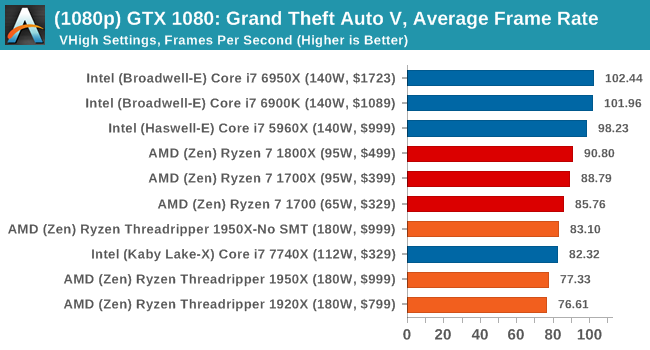
1080p

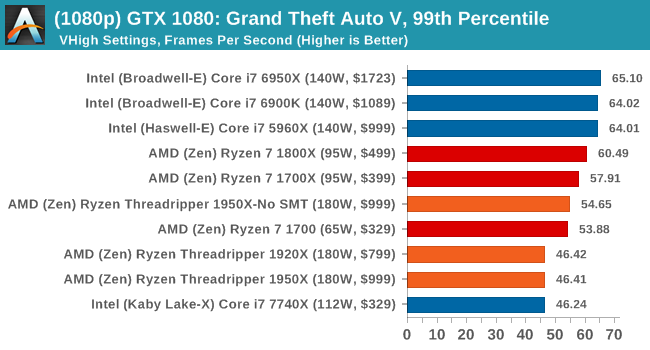
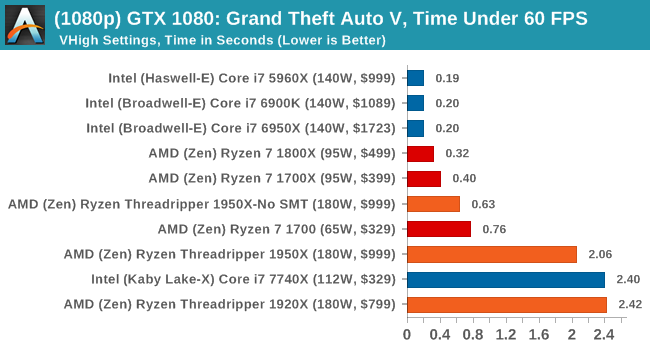
4K
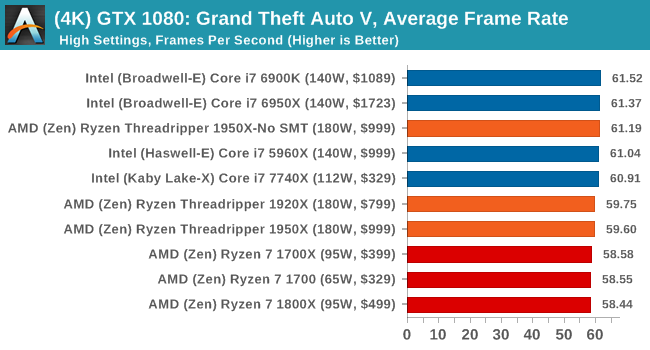
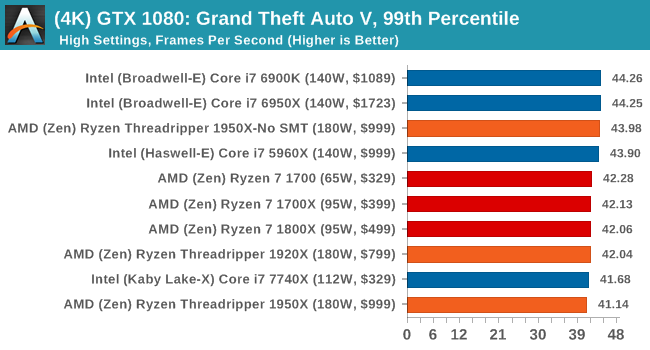
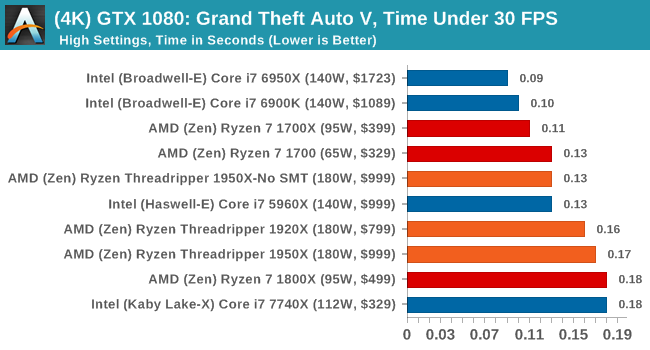
ASUS GTX 1060 Strix 6G Performance
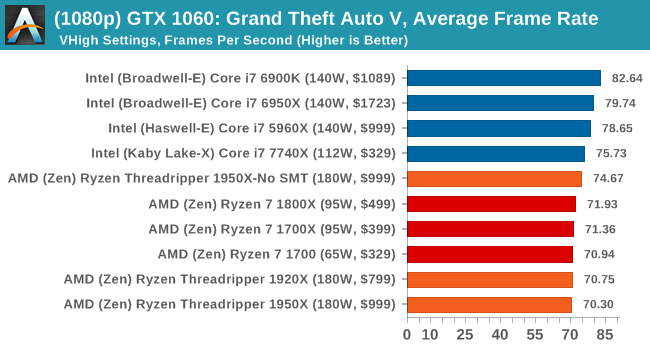
1080p

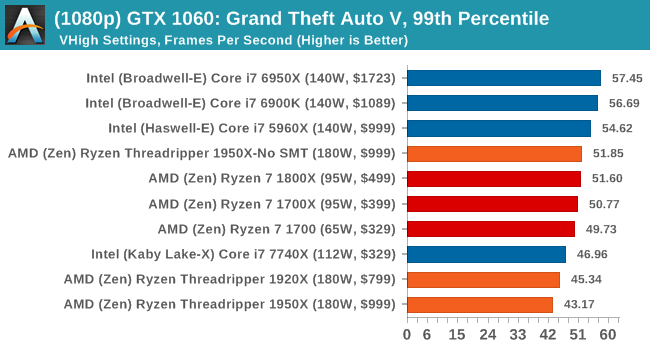
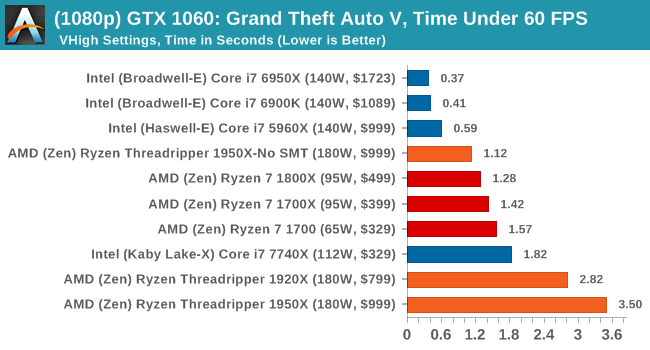
4K
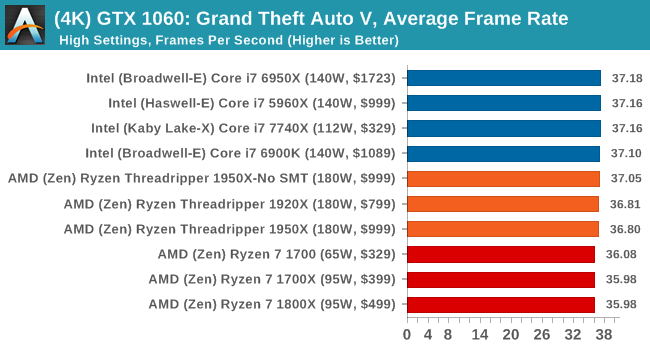
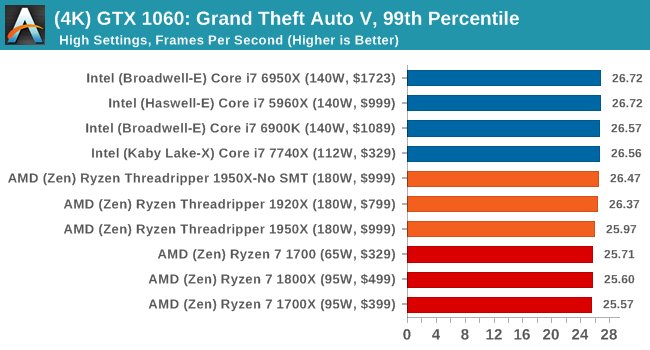
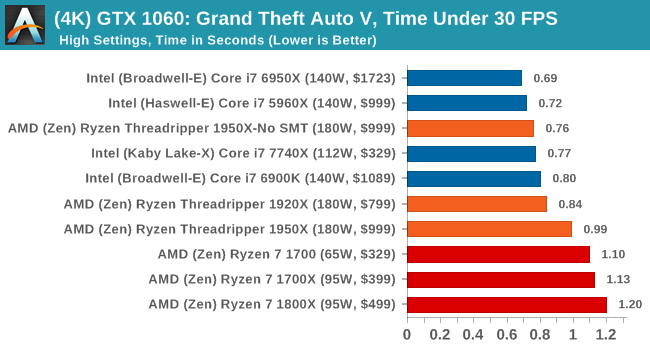
Sapphire Nitro R9 Fury 4G Performance
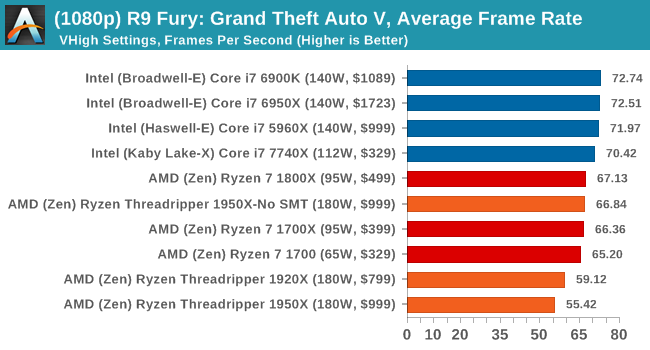
1080p

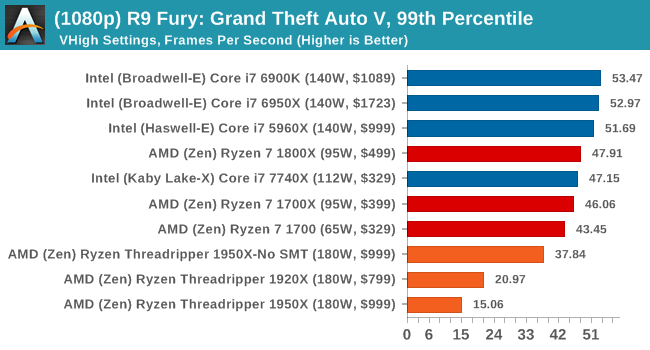
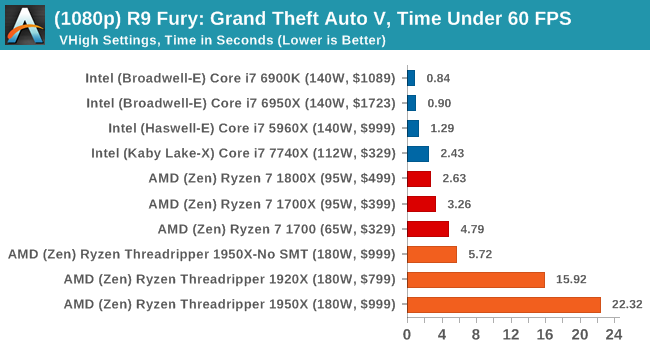
4K
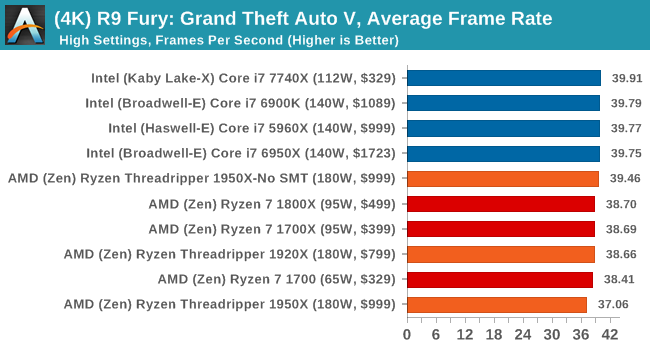
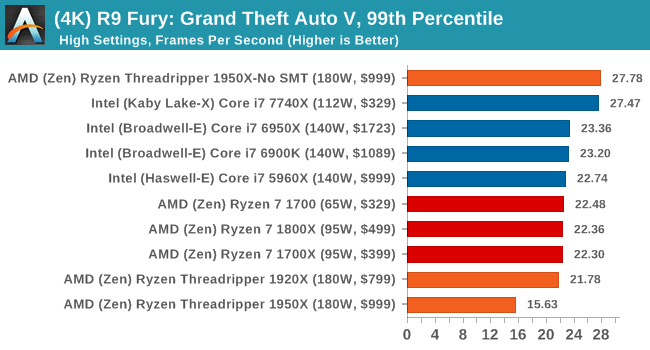
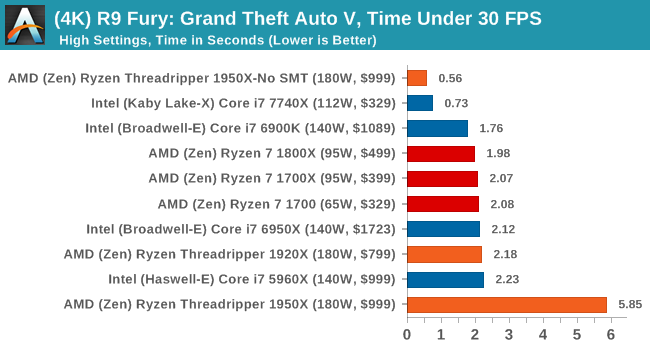
Sapphire Nitro RX 480 8G Performance
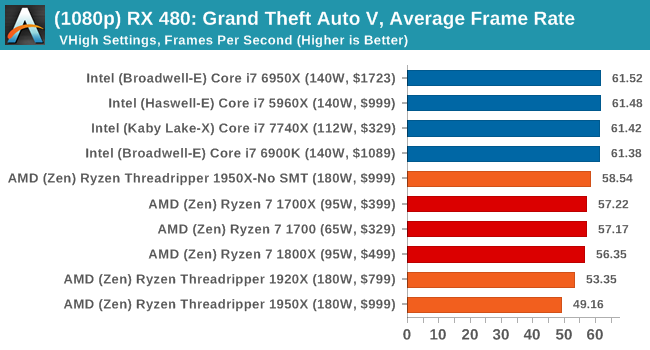
1080p

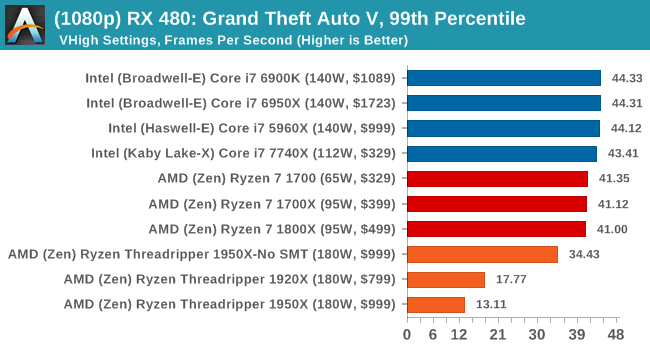
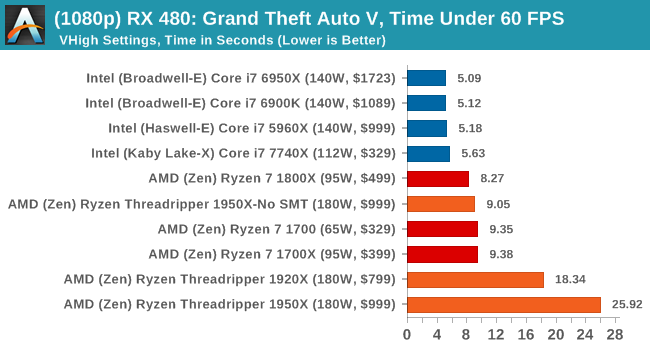
4K
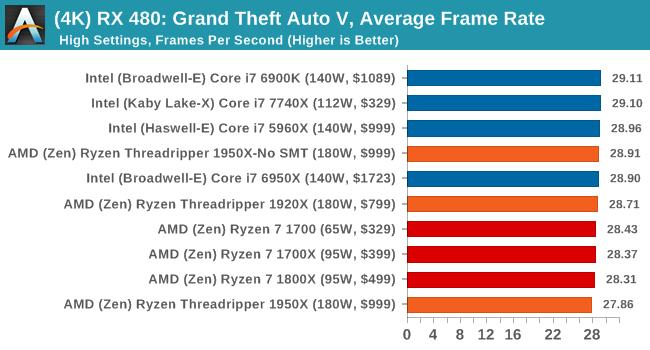
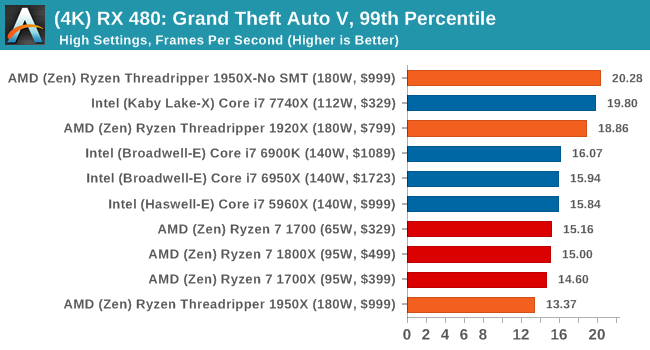
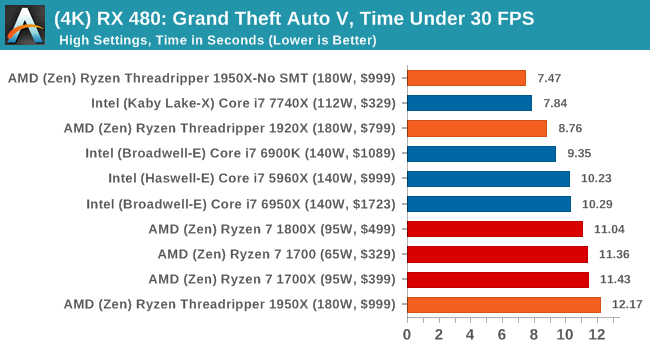
Depending on the CPU, for the most part Threadripper performs near to Ryzen or just below it.



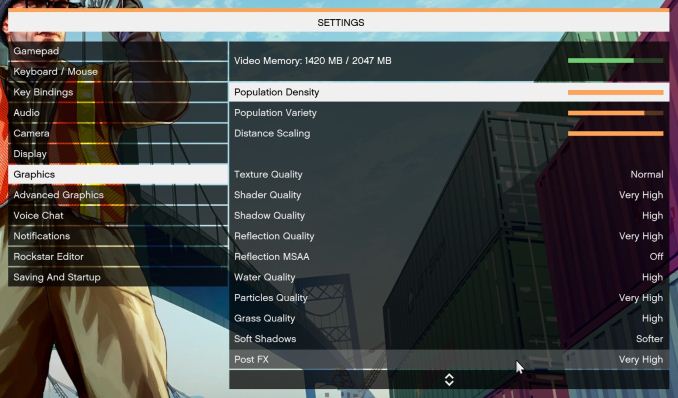
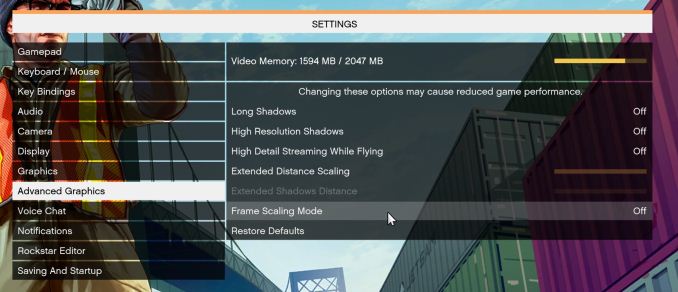








347 Comments
View All Comments
mapesdhs - Friday, August 11, 2017 - link
And consoles are on the verge of moving to many-cores main CPUs. The inevitable dev change will spill over into PC gaming.RoboJ1M - Friday, August 11, 2017 - link
On the verge?All major consoles have had a greater core count than consumer CPUs, not to mention complex memory architectures, since, what, 2005?
One suspects the PC market has been benefiting from this for quite some time.
RoboJ1M - Friday, August 11, 2017 - link
Specifically, the 360 had 3 general purpose CPU coresAnd the PS3 had one general purpose CPU core and 7 short pipeline coprocessors that could only read and write to their caches. They had to be fed by the CPU core.
The 360 had unified program and graphics ram (still not common on PC!)
As well as it's large high speed cache.
The PS3 had septate program and video ram.
The Xbox one and PS4 were super boring pcs in boxes. But they did have 8 core CPUs. The x1x is interesting. It's got unified ram that runs at ludicrous speed. Sadly it will only be used for running games in 1800p to 2160p at 30 to 60 FPS :(
mlambert890 - Saturday, August 12, 2017 - link
Why do people constantly assume this is purely time/market economics?Not everything can *be* parallelized. Do people really not get that? It isn't just developers targeting a market. There are tasks that *can't be parallelized* because of the practical reality of dependencies. Executing ahead and out of order can only go so far before you have an inverse effect. Everyone could have 40 core CPUs... It doesn't mean that *gaming workloads* will be able to scale out that well.
The work that lends itself best to parallelization is the rendering pipeline and that's already entirely on the GPU (which is already massively parallel)
Magichands8 - Thursday, August 10, 2017 - link
I think what AMD did here though is fantastic. In my mind, creating a switch to change modes vastly adds to the value of the chip. I can now maximize performance based upon workload and software profile and that brings me closer to having the best of both worlds from one CPU.Notmyusualid - Sunday, August 13, 2017 - link
@ rtho782I agree it is a mess, and also, it is not AMDs fault.
I've have a 14c/28t Broadwell chip for over a year now, and I cannot launch Tomb Raider with HT on, nor GTA5. But most s/w is indifferent to the amount of cores presented to them, it would seem to me.
BrokenCrayons - Thursday, August 10, 2017 - link
Great review but the word "traditional" is used heavily. Given the short lifespan of computer parts and the nature of consumer electronics, I'd suggest that there isn't enough time or emotional attachment to establish a tradition of any sort. Motherboards sockets and market segments, for instance, might be better described in other ways unless it's becoming traditional in the review business to call older product designs traditional. :)mkozakewich - Monday, August 14, 2017 - link
Oh man, but we'll still gnash our teeth at our broken tech traditions!lefty2 - Thursday, August 10, 2017 - link
It's pretty useless measuring power alone. You need to measure efficiency (performance /watt).So yeah, a 16 core CPU draws more power than a 10 core, but it also probably doing a lot more work.
Diji1 - Thursday, August 10, 2017 - link
Er why don't you just do it yourself, they've already given you the numbers.